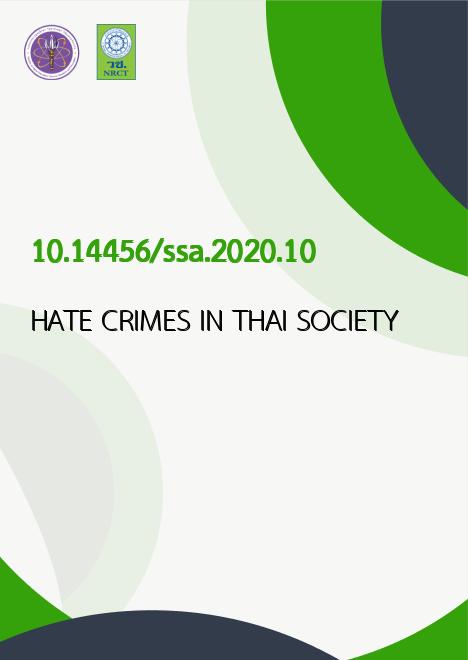
|
HATE CRIMES IN THAI SOCIETY |
|---|---|
| รหัสดีโอไอ | |
| Creator | Manitta Chanchai |
| Title | HATE CRIMES IN THAI SOCIETY |
| Contributor | Chanapat Maneedul, Pisinee Chotichuti |
| Publisher | National Research Council of Thailand |
| Publication Year | 2563 |
| Journal Title | SOCIAL SCIENCE ASIA : Official Journal of National Research Council of Thailand In conjunction with Journal of Thai Justice System |
| Journal Vol. | 6 |
| Journal No. | 2 |
| Page no. | 1-15 |
| Keyword | hate crimes, hatred, violence, revenge |
| URL Website | http://e-journal.nrct.go.th/ |
| Website title | e-journal |
| ISSN | 2229-2608 |
| Abstract | 'Hate crimes' are defined as crimes committed by perpetrators where the motive is, partially or entirely based on, prejudice, negative impression, or hatred towards the victims. Such hatred is founded in the perpetrators' attitude toward differences in certain features of the victims, such as ethnicity, nationality, race, identity, religion, belief, membership in a minority group, sexual orientation, disability, political views, caste, social status, etc. Perpetrators of hate crimes are not mentally deviant. They commit such crimes due to a personal sentiment of contempt or bias against a collective group of people, rather than on the particular individual, as a result of the victim's appearance or tendency to belong to such group. Nowadays, hate crimes tend to occur globally, especially in countries where there is a high level of diversity; for example, where ethnicity, religion, race, or sexual orientation, is prevalent. Hate crimes do not target only an individual but any individuals considered as members of the group hated by the perpetrators, and therefore, damage and terrorise individuals, public order and the entire community. An analysis on hate crimes in the context of Thai society was conducted through four case studies reflecting academic definitions of hate crimes. These are Case Study 1 Insurgency in the Southern Provinces, Case Study 2 Bias based on gender identity, Case Study 3 Conflicts between students of different vocational institutes and, Case Study 4 Bias as a result of a difference in political views. These four cases demonstrate that hate crimes exist in Thailand and not only cause damages to the victims but also create fear for individuals belonging to the same groups of the victims. This article proposes some methods for the prevention and solution of hate crimes as follows; 1. Policy recommendation; 1) Listing prevention and solution to hate crimes as a national agenda by determining strategy and policy against hate crimes at all levels and 2) Exploring and developing measures in response to hate crimes, such as the amendment and development to pertinent laws, including criminal law, definitions, and sanctions for the commitment of hate crimes. 2. Academic recommendation; 1) Learning and understanding of violence in society and 2) Promoting and supporting researches and a body of knowledge on violence and crimes including hate crimes. 3. Action recommendation; 1) Fostering peaceful settlement of disputes among members of society 2) Promoting a culture of exchange of knowledge in Thai society through open-mindedness and encouraging expression of constructive comments and opinions, andawareness of diversity and tolerance for different opinions 3) States shall facilitate dialogues by all sectors to commit to resolving conflicts peacefully and 4) Promoting implementation of civic virtue in citizen's quotidian lives as it is a foundation of peaceful society. |